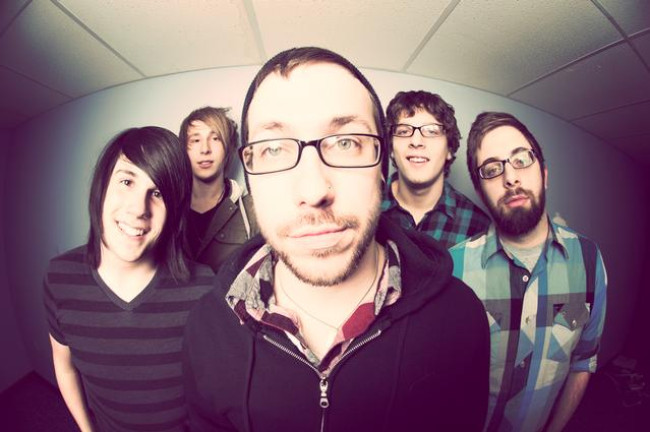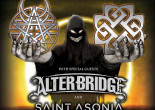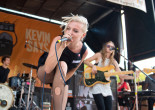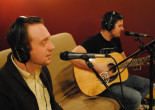EXCLUSIVE: Terror on the Screen will reunite for the 2016 Electric City Music Conference in Scranton

From 2008, when they played their first show opening for Four Year Strong, until 2011, when they played their last show opening for Hit the Lights, Terror on the Screen was one of Northeastern Pennsylvania’s most popular bands. The band will reunite for one final performance at the 2016 Electric City Music Conference in September.
The pop punk standouts that often found themselves knee-deep in metalcore crowds played the Vans Warped Tour twice, shared the stage with New Found Glory and Cartel, had Title Fight and Balance and Composure open for them, and turned down a really bad record deal.
ECMC co-founder Joe Caviston recently had a chance to catch up with Chris Ventura, Jerry Bruno, Kyle Williams, and Bryan Filarsky from the band for an exclusive interview for NEPA Scene. Lead singer George Yurchak was taking a nap at the time of the conversation.
NEPA SCENE: Let’s start at the beginning. Can you guys tell me a little about the formation of Terror on the Screen?
JERRY BRUNO: Once upon a time…
CHRIS VENTURA: Well, George and I were always playing shows together with our other bands. In summer 2008 (or so), George reached out to me. He was looking to start a new project and wanted to know if I would be interested. I was moving to the area and needed a new band, so it was perfect timing. We started jamming and grabbed a few friends to complete a lineup and write a quick set.
Two months after our first practice, we played our first show at Tink’s in Scranton with Four Year Strong, Set Your Goals, and Energy. I still have no idea how we landed the show that quickly, sold tickets, got merch, and even finished writing music. But the rush of working that hard and that fast, and then playing a show with such a killer lineup, was enough to confirm that we had made the right decision.
Over the next few months, we recruited Bryan and Bruno. About a year later, Kyle was added to secure the perfect chemistry.
NS: So with your first show being with Four Year Strong and Set Your Goals, how do you think that set the tone for things to come?
CV: It was a rush for us. We were on cloud nine to just watch the lineup, let alone open for those bands as our first show. I do vaguely remember afterwards being like, “Uh oh. Now we have to top that.” So, it definitely motivated us. I specifically remember people being surprised we had a merch table. We used that to fuel the fire and to try to get that same level of feedback at every show.
KYLE WILLIAMS: It’s funny because I was at the first Terror on the Screen show to see Terror on the Screen. Then I ended up joining the band after working at PacSun with Bryan and the bassist at the time, Aaron Proch.
BRIAN FILARSKY: I was also at that show too and didn’t know any of the guys at that time.
KW: It’s funny; there’s a picture somewhere of the crowd and you can pick all of us out.
JB: I wanted to be at that show so bad, but I was at my grandma’s for Christmas. My grandma is cooler than pop punk.
BF: That is true. I met his grandma.
NS: You guys kind of came onto the scene when metalcore and hardcore were the “thing.” Even so, I remember metal kids loving your band. Why do you think that is?
KW: I think it’s because we all grew up in that metal/hardcore scene. Deep down, every “br00tal kid” loved pop punk. But we rooted ourselves individually in the early Jessup Dome shows, the Staircase, and Cafe Metro. I think we transcended those influences with the aggressive edge the pop punk TOTS songs had.
CV: Attack Attack‘s first big album had just dropped, if that paints a picture of the scene at the time. It was a little intimidating at times. We would walk into a venue knowing that 85 percent of the lineup was heavy, but most of us had grown up on heavier music and were comfortable in that scene. I think being the “different” band on the bill was usually an advantage to us.
KW: George wrote really catchy melodies, but we never broke that far away from have aggressive riffs and bridges in our songs. I think that was something that a lot of those kids hadn’t really supported before but took a chance on with us.
BF: I don’t think there was a show during the time period of being TOTS that we weren’t outweighed by metalcore bands. We always got along, had fun, and loved that music ourselves.
CV: I always said that we were playing for the girls that were there because their boyfriends were there to dance. They could be like, “Oh, wow, this isn’t heavy. Babe, I love you; buy me an album.” We would draw the boys in from there.
KW: Remember when girls liked me?
CV: No.
KW: Yeah, me either.
NS: The scene, locally and nationally, has changed dramatically from those days. What do you attribute that to?
KW: I think oversaturation of one type of music, mainly. Everyone wanted to be in and was in a metalcore band. I think kids got tired of seeing bands that sounded the same over and over again. It also hurt when they played the same area more than once a month. As kids got older, bands like Title Fight and Tigers Jaw got big. Everyone’s popular musical taste changed.
JB: Surprisingly, even when we played with like eight metalcore bands, there would somehow be violence during our sets. Kids would fight while George sang a chorus about being heartbroken. It was always comical to see that.
KW: A lot of the scene got left behind and became irrelevant, despite the talent that was there. Everyone fell in love with this grunge meets emo meets hardcore stuff, which was great because there was music. But only the bands that sounded like Title Fight got followed and cared about.
BF: Yeah, that was weird that we had fights during “Nancy Drew.”
NS: Somehow, I feel like they generally involved your drummer.
CV: We were guilty for a while, as well, of listening to bands that were blowing up like Four Year Strong or A Day to Remember, and our album reflects that. We all grew up on pop, rock, and heavy music, and when you mix that many genres, it’s hard to settle. After that album came out, we started writing again and maturing away from chugs because every band was doing it then. “Pop punk” was starting to make a comeback.
KW: Yeah, we came back to what we actually loved about music and not what would make us popular. Those “breakdowns” and everything were fun, but they weren’t who we wanted to be entirely. When we wrote songs after the first album, it was never discussed that “it should sound like this or that because so and so sounds like this” or anything like that. We took a lot of what influenced us individually and applied them. It’s upsetting that it never took off like we had always dreamed.
JB: We just wanted to be on “Punk Goes Pop.”
KW: There are zero regrets about anything.
NS: I remember you guys opening for a lot of big bands. What stands out the most about those opportunities?
KW: Warped Tour, definitely. That is still the single coolest feeling that I have ever experienced.
BF: The second Warped Tour [that we played] was unreal. I didn’t realize it from the stage because we had technical problems, but I saw a video afterwards of the whole walkway clogged up. There were like three separate [mosh] pits.
JB: Definitely playing Warped Tour two years in a row and opening for New Found Glory. Those are my top three, no question. We played the same stage as Mayday Parade. Come on. That was epic.
KW: I unfortunately was only in the band for the one Warped, and I joined the band immediately after the New Found Glory show. But, yes, the fact that Mayday Parade played right after us at Warped Tour was incredible. I have never seen so many people watch us or know our music before.
CV: That second Warped Tour date we played was definitely my No. 1. I think that was definitely our peak as a band. Hell, it’s still my peak. The first one was great, and we had a decent turnout, but to play that first Warped Tour and then, only one year later, see such a difference in response, seeing that level of accomplishment in just a year was a great feeling.
NS: You guys even toured a bit, right? If I remember correctly, it was with a band from upstate New York.
KW: Sunset Atlantic, formerly known as The Doppler Effect – to this day, the best band we’ve ever had the privilege to play with and to call our friends.
JB: I remember making a bet with Bryan that if they said yes to touring with us, I would shit my pants because I didn’t think we were even remotely cool/good enough. When they broke up, I almost quit. I thought, “If they can’t make it, how the fuck are we going to?”
KW: We left the night of Warped Tour to meet them down south and to try – the keyword is “try” – to play back up the East Coast.
CW: Yeah, we left the night of Warped Tour 2010 and drove through the night to North Carolina. Half the dates were canceled. On paper, it was the worst tour ever, but I still to this day think it was the best experience of my life.
KW: There were a few things that broke us down as musicians. Sunset quitting made me lose a lot of faith in myself.
JB: That [tour] was hands down the best vacation ever.
NS: I seem to remember a “!” in your band’s name originally. Then, one day, out of the blue, I got an e-mail telling me to remove it from a flyer. What was the deal with that?
CV: Oh, that.
KW: Yeah, I never knew what the “!” was about.
JB: That’s George’s fault.
CV: I guess I have to speak to that. I honestly have no idea why that started. I want to say it was my bad. I set up the t-shirts. I have no idea who proposed it initially. So, I’m going to blame George.
KW: George wanted to be Panic! at the Disco or something
JB: Well, I guess that’s settled.
CV: I think we wanted to do something different. Let’s pretend Panic! didn’t exist. We wanted the logo to stand out. But, in no time at all, we threw that out.
KW: That’s dumb. That’s a dumb way to live.
NS: On the local level, you guys were the kings of merch. I remember it always being well-designed, and it was usually more professional-looking than the national bands. Do you think that increased the perceived value of you as local band?
JB: Definitely. We had to bring it like we were a national act. Every show we had lights and legit merch. We also played to a click track. We tried to give the impression that we actually knew what we were doing. Having Bryan and Chris design our merch was huge. They are awesome designers.
KW: It shouldn’t have because the music should be able to speak for itself. But, when you look at music as a market, which we tried to, because we wanted to be big, it definitely does. We knew how we felt when we’d go to a show and see an awesome shirt from a band. Sometimes you didn’t even like that band, but you wanted their merch.
CV: Absolutely. Yeah we were fortunate to have two designers in the band. Bryan and I could bounce ideas off each other and discuss album art and shirts based on what would sell. Most importantly, we got a killer Myspace layout. Seriously, it ruled.
JB: We wanted kids to buy our merch before they even saw us play.
NS: Those damn lights. I remember them. Bryan stole that idea from Yearling. He loved their light show.
CV: I think the towers are still sitting in Bruno’s mom’s basement.
JB: Yeah, we totally took their idea and ran with it. Ours were more complex. I was controlling them while we played. I’m surprised I was able to play and control those. That was a good time.
KW: It was a good excuse for when you sucked.
NS: On a personal note, Jerry, I remember being at your house for a party your sister was throwing. I think I was17, so you were probably 14 and playing Blink 182 covers on your drums for your sister’s friends. Can you tell our readers what happened about two hours later?
JB: Ya’ll got me hammered. I almost made it to the bathroom, but I puked Blue Wave all over the hallway. Fuck Blue Wave. Why were you losers drinking that shit anyways?
NS: Good point. I digress; your sister was pissed.
JB: It was my idea, though. I just kept drinking and you guys kept egging me on, so great influence. Look how I turned out! This is on you, Caviston!
NS: If you could give local bands a piece of advice today, what would it be?
JB: Play music you love and don’t get caught up in what could be. Just do it for the love of the music and ride the wave.™
KW: Don’t take yourself too serious; it’s never worth ever having an argument over music. It’s meant to be fun.
CV: I can’t say it much better. Play it because you love it and don’t ever doubt yourself. If we could gain a following, you can.
NS: What can fans expect from the reunion show, and why should they come out?
KW: If anything, a huge sense of nostalgia. We’re not Underoath or Thrice getting back together, but when we played, we always had fun; the crowds that we had always made it fun. If they come out, it’s going to be like that again. It’s going to be fun again.
JB: If they have a memory of our shows or a memory that comes to mind when they hear our tunes, come see them again (for the last time) and reminisce. Let the music be a time machine; I know it is for me.
KW: Big time. One of my goals musically was to have just one song that some kid and his friends could throw on and forget about any responsibility and go and drive to in the summer. That was something I always cherished about a lot of different songs. That single feeling, where you are brought back to an exact memory when you hear a song.
CV: Even when we play in our current projects, we hear, “Play ‘Nancy Drew!’” As fun as those songs were to play, it’s just not us anymore. This is the one time we’re going to play it all. If we can contribute to even one person having that nostalgic feeling, we want that person to be there. I know when I listen to certain bands we used to play with, I can remember specific shows and events. It would be great to be that trigger for someone.
by Joe Caviston
Joe Caviston is the co-organizer of the Electric City Music Conference and Steamtown Music Awards, as well as a longtime concert promoter, music manager, talent buyer, and digital marketing expert.



